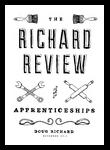Richard Review recommendations on apprenticeship assessment need careful consideration

 I have been waiting with interest for the publication of the Richard Review: an independent review of apprenticeships for the Government, led by Doug Richard. Reading the recently published report I was pleased to find many recommendations in there which I strongly support and hope will be given due attention by the Government. These include calls for high quality apprenticeships, parity of esteem with university degrees, the incorporation of maths and English skills into apprenticeships, and the assertion that apprenticeships should be seen as a job with training, and therefore that not all on the job training counts as an apprenticeship.
I have been waiting with interest for the publication of the Richard Review: an independent review of apprenticeships for the Government, led by Doug Richard. Reading the recently published report I was pleased to find many recommendations in there which I strongly support and hope will be given due attention by the Government. These include calls for high quality apprenticeships, parity of esteem with university degrees, the incorporation of maths and English skills into apprenticeships, and the assertion that apprenticeships should be seen as a job with training, and therefore that not all on the job training counts as an apprenticeship.
The review also made some interesting points around the assessment of apprenticeships, highlighting the need for a rigorous set of standards which tests the breadth of skills learnt and whether they can be effectively applied in a real world context. The stress on ‘competence’ in tandem with knowledge is exactly what is required if apprentices are to meet employer requirements and add value to their business. This, I am pleased to say, is where City & Guilds’ vocational assessments are focused.
The proposal in the review around assessment additionally states that employers should be involved in the development of apprenticeships. I couldn’t agree more – only employers themselves know what skills their businesses need to thrive and what makes an employee attractive. Therefore it is vital they play a key role in developing industry standard training and assessment, working closely with industry experts and awarding organisations, such as City & Guilds. Giving employers more ownership of apprenticeships has the potential to boost the quality of the training, which in turn will benefit both employers and apprentices. By working together, we can develop nationally and internationally recognised vocational programmes that enable learners to progress in their chosen careers.
The review also suggests that testing for apprenticeships should involve an ‘end of apprenticeship assessment.’ It will be interesting to explore how much emphasis should be placed on such an assessment in light of other research. The reality that City & Guilds has learnt from working with generations of learners is that this approach does not suit everyone, and other studies have noted how this may even lead to a gender divide; women benefit from constant assessment whilst men prefer to ‘cram’. As a result, this approach won’t necessarily deliver people who have gained the right level of training and skills to hit the ground running in a job.
Instead, apprenticeship assessment should be a culmination of previous assessments demonstrating competence, whilst also incorporating the core work-ready, softer skills that apprentices develop during their training. These don’t necessarily need to be assessed by a written exam, but should certainly be observed and formally recognised in some way.
The proposal for robust assessment of apprenticeships is definitely one that I wholeheartedly support. It must ensure learners are ready to enter the workplace. Such assessment will not only ensure that learners are given the high quality training they need to make themselves work-ready, but will also raise the status of apprenticeships enabling them to be viewed as a valuable alternative to university, and a viable route to career progression. Nonetheless, there must be flexibility around this idea. The main objective of an apprenticeship is always to deliver tomorrow’s workforce with specialist skills and we must ensure that any changes to assessment are made with that goal in mind.
Chris Jones is chief executive and director general of City and Guilds, the awarding body











Responses